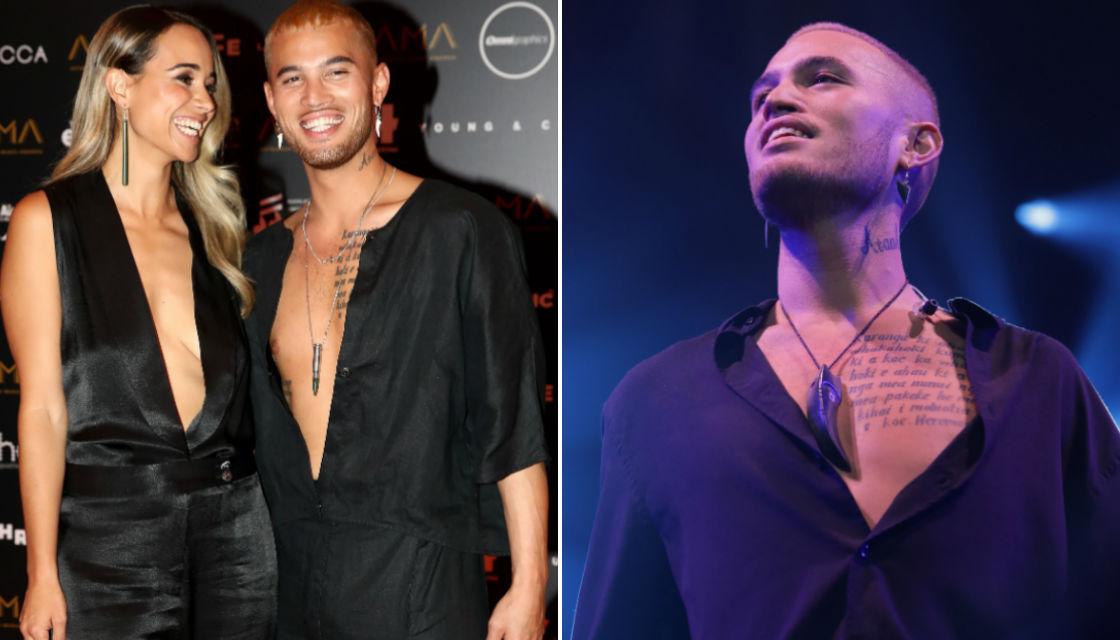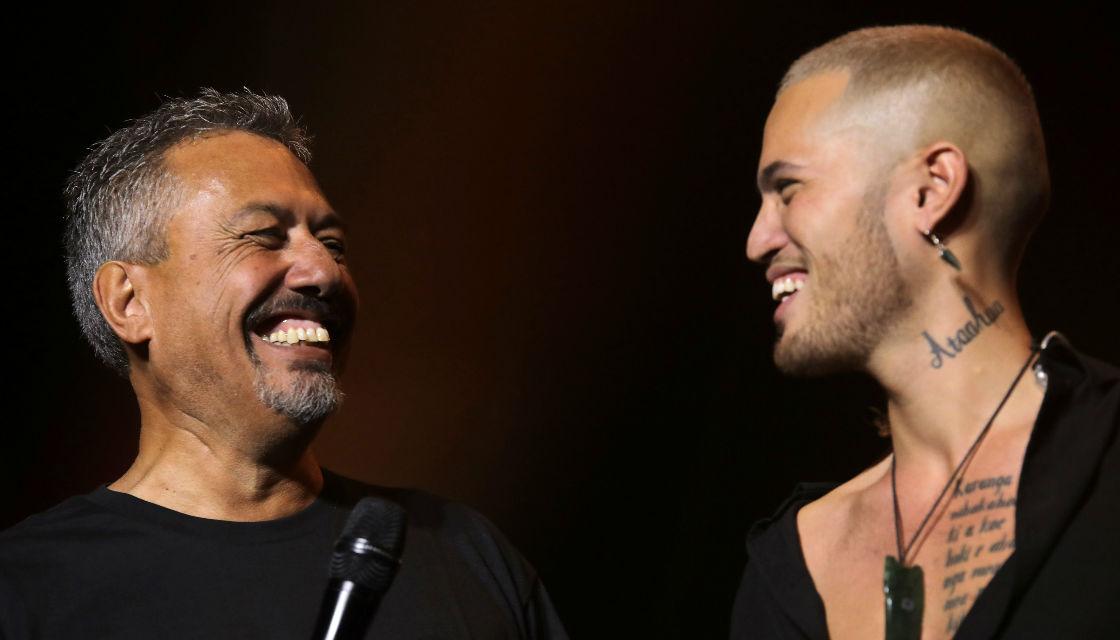This is the first instalment in Newshub's Who I Am series, taking a deeper look into the lives of Kiwis making a difference by exploring their passion, work ethic and values.
With power comes responsibility, and Stan Walker doesn't just know it; using his fame for good is one of the most valued parts of his life.
He's making a difference inspiring and helping others by drawing on the same tool that's granted him the public standing to be able to do so - his voice.
It's been a huge year for the music star, carrying no secrets into 2021 after turning against the code of silence he grew up abiding in the Bay of Plenty.
To help others has meant opening up about his difficult upbringing in a home where the little money around was spent on drugs and alcohol, and violence and emotional abuse was accepted as a part of daily life.
He remembers as a child battling feelings of rejection, hate, isolation, loneliness and shame while facing random beatings from his father Jeff, who could use almost any household item from a broomstick to a vacuum cleaner pipe to hurt Stan, his three brothers, sister and mum April.
"Our education was don't do that, otherwise you're going to get a hiding. You couldn't ask why, because the why is 'because you're going to get a hiding', he tells Newshub.

His confidence was pushed to breaking point at 8 years old when an older relative sexually abused him almost daily for nine months but it was the manipulation and pressure to keep the secret that scarred him long-term.
Sharing his story has been tough but allowed him to stand out as an example, paving a pathway as a leader for rangatahi who might endure similar hardships, showing they can make it out the other side too.
"I've never talked about trauma so much and lifting the lid on so many things that are quite painful for myself and for my family, but at the same time, if I'm going to be the example to set other people free, because I'm free, then so be it.
"All the hard work, all the sacrifices that my parents, my grandparents, all my tīpuna made so that we can exist in this world - not just to exist, but thrive and be outrageous in everything we do - I'm now part of that story, and now I'm the breaker of chains."
His determination to inspire has included visiting audiences around the country promoting his book Impossible in which he talks everything from the abuse, contemplating suicide, understanding his family dynamic and making it out the other side of his cancer battle.
"All the things that were meant to destroy me, to kill me in every way, are now my tools to help other people. Who am I to live this life of freedom if I can't share it? If I have this incredible platform to speak to people, and I'm not actually using it to influence people and help people be free, then I'm kind of wasting my calling, I'm wasting my purpose."
His truth now offers others a source of hope and strength but it's only possible after confronting his denial.
"Forgiveness was the biggest thing. Forgiveness for myself first, then to forgive people who have hurt me and, to be honest, I've hurt many people as well, and I've been that person on both ends."

Trauma doesn't burden the 30-year-old today, but erasing the mental scars has taken a fresh perspective generated by pivotal moments - the first confronting him twelve years ago, defining his relationship with God.
An open-mind encourages him to be understanding, particularly when it comes to his father's former temper and unpredictable ways.
"He'd never heard 'I love you'. His dad used to smash him from his first memory until his last," Stan explained.
"He watched his mother getting thrown out of windows fully pregnant, he watched his mother lose like eight babies, he was just the by-product of a by-product, and started to become that to us."
Putting love and empathy first has allowed forgiveness to set him free. A deep appreciation for his family, generosity towards his friends, and love for his dad, act as pillars to help him speak without boundaries.
"I'm like 'How could you know love, how could you be anything but a monster when you've been raised to be a monster?' We sit there and we break things down, even if it hurts us."

He's innately proud of his heritage as a New Zealander and as Māori, viewing culture as a superpower, conditioned in tikanga practices, taught by whanāu and kaumātua, from his time on his marae in Mount Maunganui as a kid. Young people in that environment now are who he wants to appeal to most.
"There's so much to celebrate in our country, with our people, with the achievements of not just Māori, but New Zealanders, people from Aotearoa - we are the example. Let's celebrate rather than pull down, and trying to find the goss and the tea."
Walker credits the "spaces and places" he's experienced travelling the world and meeting new people since winning Australian Idol at 18 to his conscious frame of mind that encourages compassion and understanding.
Thinking back to when it all began, Walker recalls being overwhelmed with nerves going into the audition, but it was the first live performance when he shook uncontrollably.
"But then I got through it, and then it got easier... now it's like that allowed me to be this."
The TV show catapulted him into a new world, earning him a recording deal with Sony Music that saw him release his first of many hits as a pop artist overnight.
Growing popularity cemented his standing as a celebrity. He was a judge on New Zealand's first season of the X Factor in 2013 before stepping up as a ring-in on the second season in 2015, when Natalia Kills and Willy Moon were booted from the show.
But at 26, he was diagnosed with stomach cancer one week after going for a routine check-up, and things instantly changed.

Doctors had found 13 lesions on the singer's stomach. The organ was removed to free him of the gastric disease responsible for taking the lives of more than 50 members of his family, but it was his dramatic weight loss that captured the widespread interest and triggered a flurry of speculation ahead of him going public with the diagnosis.
He says the battle was both physically and mentally hard, with the rumours about him hurting people he cared about.
"My whanau, who had no idea what this world that I live in is like and see these articles, and they see these people they know be like 'little druggie, I knew he was like that, let's bar him, let's delete his music, let's boycott him' - that hurt them because it runs deeper than just me. I represent them."
There's no ego with Walker, but there is a mighty self-belief - finely walking the line is important to him.
He says growing up Māori, there was a strong culture of shame associated with someone seen to be trying, and shaking that has meant challenging that state of mind.
"People always say 'you better be humble', and I was like 'so I can't be proud of myself?', 'so I can't believe in myself?'. Know your value, but also have humility. If you don't gas your own self up, then what's the point? You have to believe in yourself."
The ability to lead through openness is immensely valuable to him as he navigates adulthood living in the spotlight.
His memoir Impossible exposes raw details of his life, intricately discussing the elements that could have stopped him from not just reaching the top of the Kiwi music food chain, but surviving at all.

The title reflects a life turned around.
"People are like 'I want to walk on the moon'. People laugh at those people, but for me, I'm walking on the moon - I'm the impossible made possible. My family is the living example of what was impossible, and never meant to be, now we are, and so much more."
By putting all of it out there, he's revealed the deeply personal pieces about his family's life behind closed doors as well - but he says that was an important part of the process for healing to take place between him and his father.
"The penny dropped for him after reading my book because he started to see the psychology of breaking down things, all these different layers. He was reading it and he goes 'son, I get it now'.
"They have learned from me, and honestly, it's answered so many questions that they've wanted to ask me but don't know how to ask me."
Now, it's about spreading the message that even the most far-fetched dreams or change of circumstances can happen.
"Live passionately, dream outrageously, forgive more, love more, and get it - if I can do it anyone can do it. "
Watch the video




